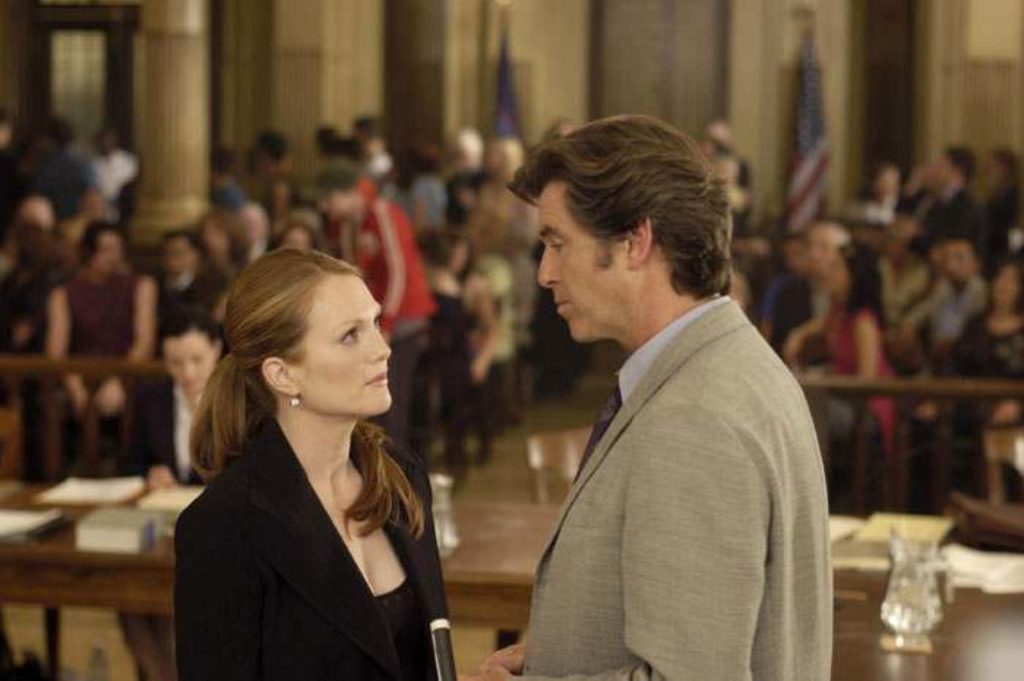
Precision defines Audrey Woods’ world. A divorce lawyer at a prestigious firm that bills itself as the Tiffany & Co. of personal litigation, she prides herself on her flawless case record, her impeccably professional fashion sense and her ability to never be foiled by inclement conditions (she’s a religious Weather Channel watcher). But beneath the porcelain-perfect facade lurks an insecure woman given to binging on junk food during moments of stress and altogether avoiding romantic situations.
Into Audrey’s neatly ordered existence steps attorney Daniel Rafferty. Slovenly, unprofessional and hopelessly romantic, he embodies everything that the cool-and-collected Audrey despises. Only adding to her disgust is that he is an excellent divorce lawyer, one who successfully challenges her in court on a regular basis. And that disgust eventually festers into outright revulsion when the two go head-to-head over a juicy case between a philandering Irish rocker and his scorned yet bloodthirsty wife. While battling over a disputed bit of real estate on the Emerald Isle, they get drunk one night and wake up in bed together—married. Can two diametrically opposed personalities who entered the holy union of matrimony on whim (and who make their livings ending that union) hope to make their relationship work?
Whereas Audrey initially regards divorce as a simple transaction that “doesn’t have to be agony,” Daniel views his profession with a healthy measure of repugnance, noting, “Divorce is the postmortem of a dead marriage.” He also laments that so much effort is put into court proceedings when all that “passion and fight” could save marriages. He confides to Audrey that he often desires to slap his clients and tell them to simply work out their problems. Later, Daniel maintains that his marriage to Audrey, despite its drunken circumstances, truly meant something. Though she quickly asks for a divorce, he states that he doesn’t believe in the practice. All of the pro-marriage rhetoric stumbles, however, when Daniel claims that true love means giving a spouse whatever he wants, even if that means dissolving the union.
A single line draws attention to the fact that damage done to a teen’s self-esteem can stretch into his adult years.
“In God We Trust” adorns a seal in a courtroom. A priest mentions that marriage is a “holy and binding” matter. An Hispanic waitress (prominently) wears a cross.
Sexual situations swirl through much of the movie’s plot. After getting smashed, it’s implied that Daniel and Audrey sleep together (audiences see clothes hitting the floor as the two cavort offscreen before waking up in bed together the next morning). While in court, Daniel proceeds to poke fun at their sexual encounter by alluding to sexual positions and flashing Audrey’s panties, which he has stolen. When the pair get intoxicated a second time, they end up tying the knot and it’s implied that they consummate the marriage (Audrey appears wearing a sheet and a bra).
When a lawyer questions a divorcée about why she was in sexual addiction treatment for six months, the woman intones that the therapist was “very good.” There is a reoccurring gag about a mixed Spanish drink that contains a maraschino cherry and is named after a male goat’s reproductive organ. Audrey falsely boasts about her many sexual conquests of male lawyers. A musician’s dalliances at brothels and whorehouses is mentioned several times, as is his alleged genital piercing. A man uses crude terms to describe his wife’s infidelity. A married couple get interrupted while copulating on a table (they’re covered with a blanket). Before going to bed, Daniel pulls off his pants (viewers only glimpse a snatch of his modest briefs). Audrey wears a number of revealing outfits.
A rocker’s spurned wife repeatedly mentions her desire to castrate her husband. That same couple physically scuffles in court. A car plummets off a cliff.
About a dozen abuses of God’s name are major spoilers in the movie. Approximately ten profanities crop up (“s—,” “a–,” “h—“) along with a half-dozen crudities.
Twice, Daniel and Audrey get utterly plastered and both incidents lead to unsavory consequences. But instead of using the incidents instructionally, the filmmakers ignore their significance by including an abundance of casual alcohol use. Audrey and her mother imbibe at lunch. A rock star’s wife sips from a flask while weeping over her husband’s infidelity. Daniel guzzles Guinness at a beer drinking contest. Audrey swills beer while watching TV and sips wine with co-workers at dinner. Booze turns up on an episode of MTV’s Cribs and on multiple kitchen counters. Mixed drinks and moonshine also make appearances.
Audrey storms into a men’s restroom where Daniel and another gentleman are using urinals.
Hollywood has become fond of setting up two remarkably similar films in a kind of cinematic cage match and seeing which one comes out the winner. Think of the dueling huge-asteroid-is-on-a-crash-course-to-obliterate-the-earth flicks Armageddon and Deep Impact. Remember the plot device of having a personage of aristocratic caliber fall in love with a commoner, à la The Prince & Me and Chasing Liberty? And just because such celluloid dyads rarely make movie history—either individually or as a pair—doesn’t mean these “coincidences” are going to go away anytime soon.
Laws of Attraction acts like it wants to spar with the Coen Brothers’ Intolerable Cruelty: The nasty world of divorce attorneys gets rocked by the truth that marriage is an honorable institution. Attraction wins some points by significantly dialing down the crass sexual content prolific in Cruelty and minimizing its harsh profanity. But this “second” project takes blows from its muddy plot and turgid pacing, and is decked by its ultimately wishy-washy take on matrimony, affirming the institution one moment and capitulating to the necessity of divorce the next.
